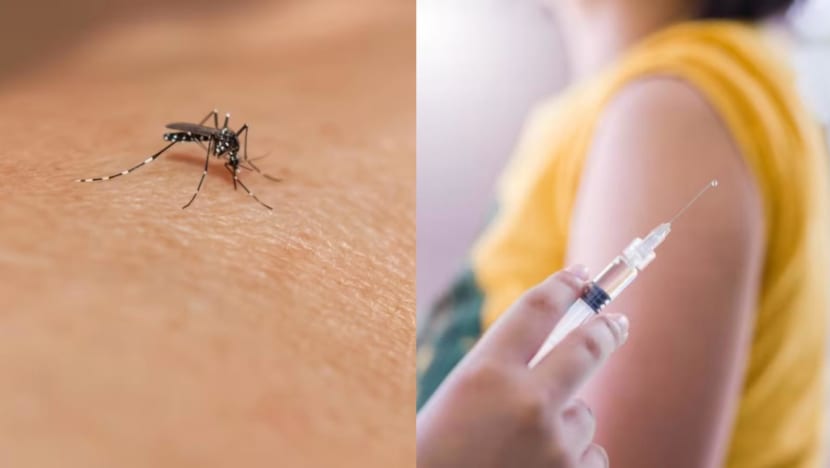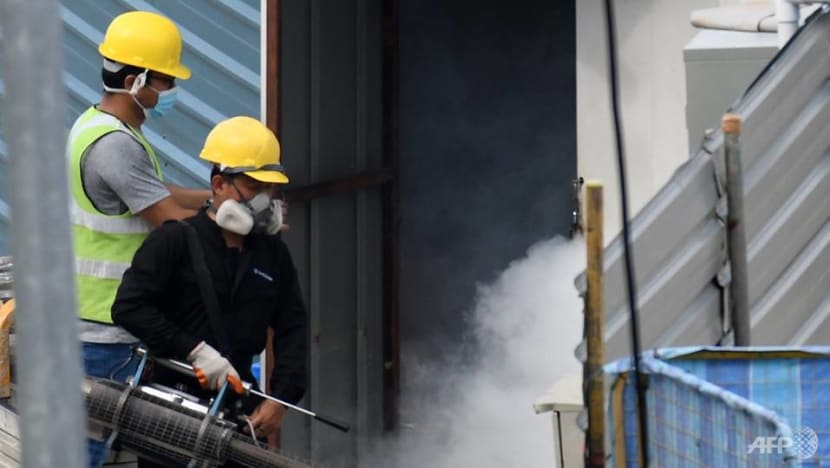Commentary: Why Singapore needs a dengue vaccine
There have been big outbreaks of dengue every year since 2019 in Singapore. Our success in controlling the number of Aedes mosquitoes is no longer sufficient, says Duke-NUS Medical School’s Ooi Eng Eong and Shirin Kalimuddin.

Composite photo of (left) an Aedes mosquito on a hand (Photo: iStock/lirtlon) and a vaccine shot (Photo: iStock/Manit Chaidee)

This audio is generated by an AI tool.
SINGAPORE: Almost every year comes with a fresh warning about dengue outbreaks - such is the nature of dengue throughout the tropics, where dengue is endemic and outbreaks occur regularly. The National Environment Agency recently called for “urgent collective action” to prevent a year-end surge in dengue cases.
There have been big outbreaks almost every year since 2019, with a record high of 35,315 cases in 2020. It is almost inevitable that we will experience another large dengue outbreak in the near future.
A sliver lining to this rather sombre outlook is that we now have newer and better dengue vaccines. Although these vaccines are not perfect, they can play a crucial role in our fight against dengue.
WHY WE NEED A DENGUE VACCINE
In Singapore, the strategy to reduce dengue has been to lower the abundance of Aedes mosquitoes that transmit dengue viruses, known as vector control. There has been a comprehensive vector control programme in place in Singapore since the 1970s.
This strategy was undoubtedly highly successful initially. When the programme was first introduced, the number of Aedes mosquitoes in Singapore and correspondingly, virus transmission rates, were high. Reducing the numbers of mosquitoes alone was thus, at the time, sufficient to prevent large dengue outbreaks.
However, Singapore’s population immunity to dengue has fallen to low levels over the past few decades (a consequence of fewer mosquitoes and reduced virus transmission). As such, vector control as a sole prevention strategy is no longer viable. Indeed, we have witnessed periodic and increasingly frequent dengue outbreaks since the 1990s.
In order to complement vector control, we now need dengue vaccines to boost overall population immunity. A parallel can be drawn to COVID-19 where masks and lockdowns were only partially effective – it took vaccines to finally bring the pandemic under control.
THE COMPLEXITY OF DENGUE
Developing a safe and effective vaccine for dengue however, has been a challenge. Previous vaccines have been less than desirable. One of the reasons for this has to do with certain peculiarities of the dengue virus and the immune response it generates.
One dengue infection does not prevent a second infection. This is because there are actually four different types of dengue virus – named dengue virus serotype 1 (DENV-1), 2, 3 and 4. These four viruses are genetically different enough that infection with one produces lasting immunity only to that particular type, but not the others. People can remain susceptible to repeated dengue infections.
To compound this, the immune responses generated after a single infection can, in some cases and under the right conditions, paradoxically worsen the second infection.
The third and fourth infections however, are usually mild or even asymptomatic. This is because the immune responses generated by two different dengue infections are broad enough to provide sufficient protection.
Finally, as a consequence of the above, dengue vaccines are usually less effective in individuals who have never had a previous dengue infection (dengue-naive), than those who have had at least one infection.
Putting this knowledge all together means that a safe and effective dengue vaccine must be able to generate similar immune responses akin to at least two separate natural dengue infections. Although it would be desirable to generate immune responses to all four dengue types, this is not absolutely necessary.
A vaccine-induced immune reponse that mirrors a response to at least two dengue infections should, in theory, protect the vaccinated from developing severe disease, even in those who are dengue-naive.

THE CURRENT ARSENAL OF DENGUE VACCINES
After decades of research, we now have two vaccines (Dengvaxia and Qdenga) that have been licensed in several countries, as well as a third (TV003) which has just completed clinical trials.
Dengvaxia was the first dengue vaccine to be licensed anywhere in the world. However, due to its design, it does not produce the same spectrum of immune responses that a person would develop after two separate dengue infections.
As a consequence, vaccination with Dengvaxia was found to increase the risk of severe dengue in dengue-naive individuals who developed breakthrough infection (which occurs despite vaccination). This increased risk was discovered during the second year of follow-up of clinical trial participants. As Dengaxia can only be safely used in those who have been previously infected with dengue, it cannot be widely deployed.
The second vaccine, Qdenga, has been approved for use within the European Union and in other countries including the United Kingdom, Thailand and Indonesia.
In clinical trials and long-term follow up, this vaccine was efficacious in protecting against infection from both DENV-1 and DENV-2, even in those who were dengue-naive. It was however, only able to protect against DENV-3 in individuals who had previous dengue infection, but not those who were dengue-naive. It is still unknown if this vaccine provides protection against DENV-4 in dengue-naive individuals, as there were too few cases during the clinical trial to make any firm conclusions.
An important difference between Qdenga and Dengvaxia is that dengue-naive Qdenga recipients did not show any evidence of increased risk of severe dengue. As such, Qdenga has been licensed for use even in dengue-naive individuals.
The third dengue vaccine, TV003, has recently completed clinical trials in Brazil with promising efficacy. The trials have shown that it generates good immune responses against all four dengue viruses, and was able to protect against both DENV-1 and DENV-2, even in dengue-naive individuals; findings from longer-term follow-up are awaited. Additional clinical trials are likely also needed to determine its efficacy against DENV-3 and DENV-4.
Another key difference is that both Qdenga and TV003 are able to generate “killer” T cells against all four dengue viruses, while Dengvaxia does not. Killer T cells are an integral part of the immune response to rid the body of virus infected cells, thus preventing severe disease.
This means that dengue-naive individuals who receive Qdenga or TV003 would be protected from severe disease, even in cases of breakthrough infection. Crucially, they would not be at increased risk of severe disease.
DON’T WAIT FOR PERFECTION
In early October, the World Health Organization's Strategic Advisory Group of Experts on Immunization recommended Qdenga for use, including in dengue-naive individuals. They also recommended that this vaccine be used in countries where dengue is highly endemic, as the benefits of vaccination in such countries are likely to be highest.
Licensing of Qdenga in Singapore will unfortunately have to be awaited. We are not considered highly dengue endemic compared to other countries in the region.
Moreover, the pharmaceutical company that developed Qdenga has withdrawn its earlier application for a licence in Singapore, in favour of resubmission with even more data from nearly five years of clinical trial follow-up.
None of the dengue vaccines, both licensed and in the development pipeline, is perfect. However we believe, based on the collective understanding of dengue vaccine science, that these vaccines are good enough. They have the potential to safely and effectively augment vector control to reduce the overall burden of dengue in Singapore.
Indeed, the implementation of dengue vaccines can draw lessons from COVID-19 vaccines. Although COVID-19 vaccines were nowhere near perfect, they were sufficient to reduce rates of severe and fatal COVID-19, and helped bring pandemic under control. It is unimaginable what the situation would be now if we had chosen to wait for the perfect COVID-19 vaccine before deploying them for use.
In a world where dengue cases continue to surge, waiting for a perfect vaccine is neither a viable nor even an ethically justifiable strategy.
Professor Ooi Eng Eong is a professor with the Emerging Infectious Diseases programme at Duke-NUS Medical School.
Dr Shirin Kalimuddin is a senior consultant in the department of Infectious Diseases at the Singapore General Hospital. She is also an assistant professor with the Emerging Infectious Diseases programme at Duke-NUS Medical School.




















